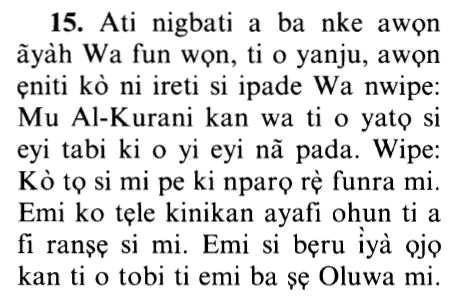10vs15
Select any filter and click on Go! to see results
وَإِذَا تُتْلَى عَلَيْهِمْ آيَاتُنَا بَيِّنَاتٍ قَالَ الَّذِينَ لاَ يَرْجُونَ لِقَاءنَا ائْتِ بِقُرْآنٍ غَيْرِ هَـذَا أَوْ بَدِّلْهُ قُلْ مَا يَكُونُ لِي أَنْ أُبَدِّلَهُ مِن تِلْقَاء نَفْسِي إِنْ أَتَّبِعُ إِلاَّ مَا يُوحَى إِلَيَّ إِنِّي أَخَافُ إِنْ عَصَيْتُ رَبِّي عَذَابَ يَوْمٍ عَظِيمٍ
Waitha tutla AAalayhim ayatuna bayyinatin qala allatheena la yarjoona liqaana iti biquranin ghayri hatha aw baddilhu qul ma yakoonu lee an obaddilahu min tilqai nafsee in attabiAAu illa ma yooha ilayya innee akhafu in AAasaytu rabbee AAathaba yawmin AAatheemin
Index Terms
Click to play
Yoruba Translation

Hausa Translation
Kuma idan anã karatun ãyõyĩnMu bayyanannu a kansu, sai waɗanda bã su ƙaunar gamuwa da Mu, su ce: "Ka zo da wani Alƙur´ãni, wanin wannan, ko kuwa ka musunyã shi."(1) Ka ce: "Bã ya kasancħwa a gare ni in musanyã shi da kaina. Bã ni biyar kõme fãce abin da aka yiwo wahayi zuwa gare ni. Kuma, haƙĩƙa ni inã tsõro idan na sãɓã wa Ubangijina, ga azãbar wani yini mai girma."
Asbabu n-Nuzuul (Occasions of Revelation)
(And when Our clear revelations are recited unto them, they who look not for the meeting with Us sayナ) [10:15]. Mujahid said: モThis verse was revealed about the idolaters of Meccaヤ. Muqatil said: モIt is a question of five people: Abd Allah ibn Umayyah al-Makhzumi, al-Walid ibn al-Mughirah, Mukraz ibn Hafs, Amr ibn
Abd Allah ibn Abi Qays al-Amiri and al-Asi ibn Amir. These people said to the Prophet, Allah bless him and give him peace: Bring a Qurメan which does not enjoin leaving the worship of al-Lat and al-Uzzaメ ヤ. Al-Kalbi said: モThis verse was revealed about the scoffers who said: O Muhammad, bring another Qurメan which contains the questions we will put to youメ ヤ.
Obstinance of the Chiefs of the Quraysh
Allah tells;
وَإِذَا تُتْلَى عَلَيْهِمْ آيَاتُنَا بَيِّنَاتٍ قَالَ الَّذِينَ لاَ يَرْجُونَ لِقَاءنَا ائْتِ بِقُرْآنٍ غَيْرِ هَـذَا أَوْ بَدِّلْهُ ...
And when Our clear Ayat are recited unto them, those who hope not for their meeting with Us, say: "Bring us a Qur'an other than this, or change it.''
Allah tells us about the obstinance of the disbelievers of the Quraysh, who were opposed to the message and denied Allah. When the Messenger read to them from the Book of Allah and His clear evidence they said to him: "Bring a Qur'an other than this.'' They wanted the Prophet to take back this Book and bring them another book of a different style or change it to a different form. So Allah said to His Prophet:
... قُلْ مَا يَكُونُ لِي أَنْ أُبَدِّلَهُ مِن تِلْقَاء نَفْسِي ...
Say: "It is not for me to change it on my own accord;
This means that it is not up to me to do such a thing. I am but a servant who receives commands. I am a Messenger conveying from Allah.
... إِنْ أَتَّبِعُ إِلاَّ مَا يُوحَى إِلَيَّ إِنِّي أَخَافُ إِنْ عَصَيْتُ رَبِّي عَذَابَ يَوْمٍ عَظِيمٍ ﴿١٥﴾
I only follow that which is revealed unto me. Verily, I fear the torment of the Great Day (the Day of Resurrection) if I were to disobey my Lord.
يخبر تعالى عن تعنت الكفار من مشركي قريش الجاحدين المعرضين عنه أنهم إذا قرأ عليهم الرسول صلى الله عليه وسلم كتاب الله وحجته الواضحة قالوا له ائت بقرآن غير هذا أي رد هذا وجئنا بغيره من نمط آخر أو بدله إلى وضع آخر قال الله تعالى لنبيه صلى الله عليه وآله وسلم " قل ما يكون لي أن أبدله من تلقاء نفسي " أي ليس هذا إلي إنما أنا عبد مأمور ورسول مبلغ عن الله " إن أتبع إلا ما يوحى إلي إني أخاف إن عصيت ربي عذاب يوم عظيم " .
"وإذا تتلى عليهم آياتنا" القرآن "بينات" ظاهرات حال "قال الذين لا يرجون لقاءنا" لا يخافون البعث "ائت بقرآن غير هذا" ليس فيه عيب آلهتنا "أو بدله" من تلقاء نفسك "قل" لهم "ما يكون" ينبغي "لي أن أبدله من تلقاء" قبل "نفسي إن" ما "أتبع إلا ما يوحى إلي إني أخاف إن عصيت ربي" بتبديله "عذاب يوم عظيم" هو يوم القيامة
" تتلى " تقرأ , و " بينات " نصب على الحال ; أي واضحات لا لبس فيها ولا إشكال .
I'raab - grammatical analysis of the Qur'an
«وَإِذا» الواو استئنافية وإذا ظرف زمان يتضمن معنى الشرط.
«تُتْلى » مضارع مبني للمجهول مرفوع بالضمة المقدرة على الألف للتعذر والجملة مضاف إليه.
«عَلَيْهِمْ» متعلقان بتتلى.
«آياتُنا» نائب فاعل ونا مضاف إليه.
«بَيِّناتٍ» حال منصوبة بالكسرة لأنها جمع مؤنث سالم.
«قالَ الَّذِينَ» ماض والاسم الموصول فاعله والجملة لا محل لها لأنها جواب شرط غير جازم.
«لا يَرْجُونَ» لا نافية ومضارع مرفوع بثبوت النون والواو فاعل والجملة صلة.
«لِقاءَنَا» مفعول به ونا مضاف إليه.
«ائْتِ» أمر مبني على حذف حرف العلة وفاعله مستتر والجملة مقول القول.
«بِقُرْآنٍ» متعلقان بائت.
«غَيْرِ» صفة.
«هذا» الها للتنبيه واسم الإشارة في محل جر مضاف إليه.
«أَوْ بَدِّلْهُ» معطوف على ائت والهاء مفعوله وفاعله مستتر.
«قُلْ» أمر وفاعله مستتر والجملة مستأنفة.
«ما» نافية.
«يَكُونُ» مضارع ناقص والجملة مقول القول.
«لِي» متعلقان بالخبر المحذوف المقدم.
«أَنْ» ناصبة.
«أُبَدِّلَهُ» مضارع منصوب والهاء مفعوله والفاعل مستتر وان وما بعدها في تأويل مصدر في محل نصب اسم يكون.
«مِنْ تِلْقاءِ» متعلقان بأبدله.
«نَفْسِي» مضاف إليه والياء مضاف إليه.
«أَنْ» حرف نفي.
«أَتَّبِعُ» مضارع فاعله مستتر.
«إِلَّا» أداة حصر.
«ما» اسم موصول مفعول به.
«يُوحى » مضارع مبني للمجهول ونائب الفاعل مستتر.
«إِلَيَّ» متعلقان بيوحى والجملة صلة.
«إِنِّي» إن واسمها والجملة مستأنفة.
«أَخافُ» مضارع فاعله مستتر والجملة خبر إني.
«أَنْ» شرطية.
«عَصَيْتُ» ماض وفاعله والجملة ابتدائية.
«رَبِّي» مفعول به منصوب بالفتحة المقدرة على ما قبل ياء المتكلم والياء مضاف إليه.
«عَذابَ» مفعول به لأخاف.
«يَوْمٍ» مضاف إليه.
«عَظِيمٍ» صفة
